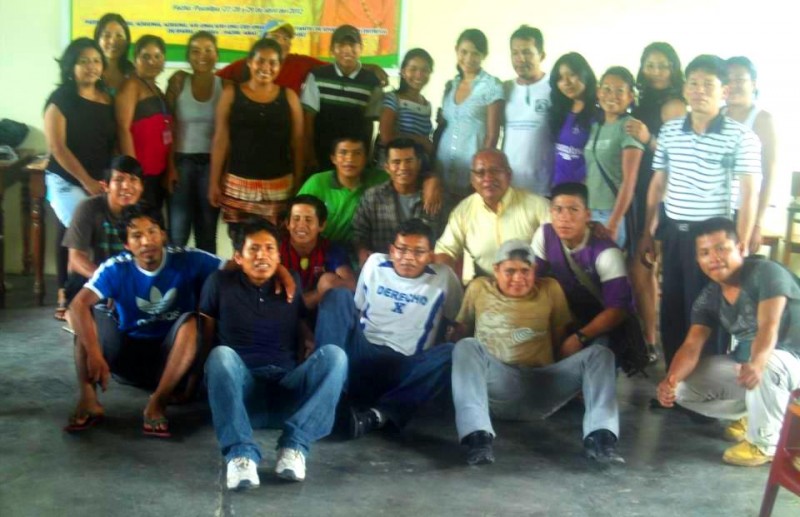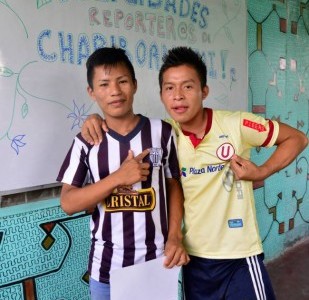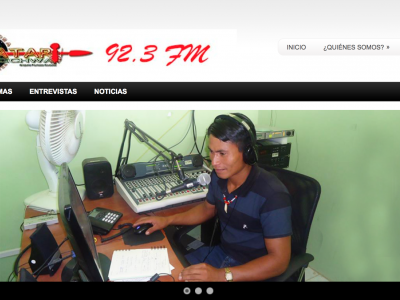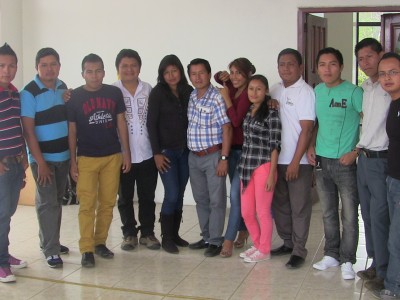Rising Voices note: This is the first project update written by our grantee project in Peru as part of the Rising Voices Amazonia initiative. Every month, grantees will write a blog post highlighting their progress.

Members of the OJIRU. Photo used with permission by project organizers.
We are very pleased and grateful to be be able to start the project “Chariboan Joi,” which means “Voices Soaring Like the Maracaná Macaw” in the Shipibo language. We chose that name because those parrots are very boisterous and travel long distances, which is what we seek with our stories.
The project is a joint initiative of the Organization of Indigenous Youth of the Ucayali Region (OJIRU for its initials in Spanish) and the NGO Arkana Alliance (AA). Before starting the project, a friendship had already been established between members of the two institutions, but this adventure gave us the opportunity to get to know one another better, especially to recognize our common dreams and aspirations.
In essence, we seek to promote the creation of a core group of young Shipibo reporters that will share stories, traditional knowledge, everyday experiences, as well as the threats to our territories due to the extractive industries and policies that unfortunately only consider indigenous rights in a symbolic manner.
In late November 2014, we will hold an arts and cultural festival in the Shipibo community of Nueva Betania, located in the Peruvian Amazon, four hours upstream from the city of Pucallpa along the majestic Ucayali River in the region of the same name. Three neighboring communities will also take part. And we expect a turnout of at least 300 people.
On the morning of the festival, 50 young Shipibo will be trained in the use of mobile phones for use as a journalistic tool to record audio content and then later go around the community creating reports. At night, community elders will narrate traditional stories in Shipibo, among other activities.
Later, in the city, the story of the festival will be translate into Spanish and english; 12 young people will be trained in digital journalism and the OJIRU's online communication will be strengthened. The content will be uploaded to the websites of OJIRU and AA, and it will be shared through local radio stations and loudspeakers in public spaces.
An informed people can not be easily fooled. There is certainly a long way to go in order to reclaim many rights that were taken since the creation of countries in our homelands, but we have hope that this will be possible within our generation and the ones to follow in our footsteps.
One of the weapons is the use of the media, and we want to contribute by sowing the seeds from the grassroots. We hope that the strategies will grow, diversify, and adapt to a technologically changing world. And the fruits will be provided as soon as possible.
Irake (thank you in the Shipibo language)
Project Team
We would like to end by introducing the intercultural, interdisciplinary, intergenerational team comprised of several nations that will be responsible for the Chariboan Joi project:
Youth from the Shipibo Peoples (Peru):
- Jamer Lopez: OJIRU policymaker. He studied administration. Currently participating in the Internship in Leadership and Entrepreneurship on Climate Change for Sustainable Development “Generation +1″. He is president of OJIRU.
- Elvio Cairuna: replaces Lopez in his absence. Currently studying to be a teacher. He has experience in facilitating community development projects. He is vice president of OJIRU.
- Demer Gonzales: OJIRU official delegate. Because of his interest in the defense of indigenous and environmental rights, he is currently studying law. He's the regional spokesperson for Ucayali in the Network of Indigenous Youth Organizations Peru – REOJIP. He is the first representative of OJIRU.
- Nestor Paiva
: OJIRU technical advisor. It is an indigenous cultural promoter bilingual intercultural experience in audiovisual communication; it is also dramatic and plastic artist. He founded the Collective Green Initiatives Yankon Nete.
- Douglas Tangoa: community representative of the Nueva Betania. He studied psychology. He is a youth leader in the areas of art and the environment. He is currently a sociocultural organizer at the Chonon Rawa school located 30 minutes away from his community.
And Alianza Arkana (not so young … but young at heart):
- Diego Villegas (Peru): AA liaison to Rising Voices. He has worked 14 years in the Peruvian Amazon, and his experience has generated some skills of intercultural communication and mutual understanding. He is the Director of Social Agroforestry with AA.
- Lily Hollister (USA): technical communications consultant, who will focus primarily on training and strengthening the community and OJIRU reporters. She is the Communications Coordinator with AA.
- Dr. Paul Roberts (England) will be our advisor. He is a consultant in leadership, coaching and teamwork. He is the Director of Intercultural Education with AA.



